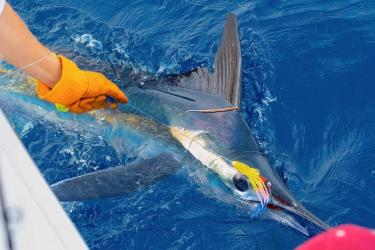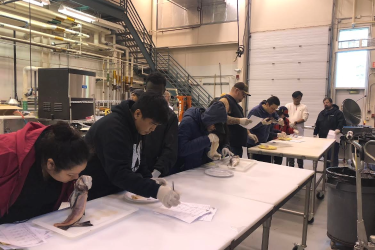NOAA Fisheries and its Gulf of Mexico partners have taken an important step toward incorporating state recreational catch estimates into the federal stock assessment and management process. At the Gulf State Recreational Catch and Effort Surveys Transition Workshop, partners agreed to pursue a two-path transition toward the full use of state data.
Path One
The first path will implement state-specific calibration approaches to ensure data from surveys in Texas, Louisiana, Mississippi, Alabama, and Florida inform regional stock assessments. This approach will ensure state data are used in a way that is compatible with historic estimates produced by NOAA Fisheries’ Marine Recreational Information Program. The incorporation of multiple data streams into comparable time series of recreational catch is expected to improve stock assessments.
Workshop participants discussed two assessments in detail: SEDAR 72, for Gulf of Mexico Gag Grouper, and SEDAR 74, for Gulf of Mexico Red Snapper.
SEDAR 72
Workshop participants determined that, where appropriate, Marine Recreational Information Program estimates for Florida’s private boat anglers will be calibrated to Florida State Reef Fish Survey estimates. The resulting time series will inform the SEDAR 72 stock assessment. This approach is pending approval of the associated calibration factors by a team of statistical consultants.
SEDAR 74
Participants determined the SEDAR 74 stock assessment will use Marine Recreational Information Program estimates for Mississippi, Alabama, Florida, and, from 1981–2013, Louisiana. The assessment will also use LA Creel estimates (2014–beyond) and Texas Coastal Creel Survey estimates (1983–beyond) that have been calibrated to the MRIP time series. This covers strata not sampled by the MRIP surveys. Annual catch limits will be calibrated to the currencies of each state’s data collection program, so states may continue to monitor catch using their own data.
Path Two
The second path will involve research into potential sources of error that may be driving differences between data collection programs. Understanding these differences will help identify improvements to both state and federal recreational fishing surveys. These improvements are expected to bring estimates closer together. Short- and long-term research priorities will be informed by recommendations from a team of statistical consultants. They will also meet the terms of a congressional directive to assess and improve the accuracy and precision of federal and state recreational fishing surveys in the Gulf of Mexico.
To facilitate the transition process, workshop participants also agreed that state agencies would store their raw recreational fishing data and calculated catch and effort estimates in a common database. Partners will work together to develop associated data standards.
“Managing our marine resources well is of vital importance to anglers in the Gulf of Mexico,” said Dave Donaldson, Executive Director of the Gulf States Marine Fisheries Commission. “We believe that this collaborative approach of state, federal, and fishery management council staff working together to address concerns and make improvements to recreational data collection programs is going to result in the highest quality data possible used in science and management.”
Next Steps
A recording of the workshop and a report on its proceedings will be posted to the workshop’s event page. A formal transition plan will document the transition approach and timeline. The need for a transition plan is outlined in NOAA Fisheries’ Policy Directive for Implementing Recreational Fishery Catch and Effort Survey Design Changes (PDF, 4 pages). The steps of the transition process are described in Guidance and Procedures for the Transition Process for Modification of Recreational Fishing Catch and Effort Methods (PDF, 5 pages). To receive news and updates about this process, subscribe to the MRIP Newscast.
“NOAA Fisheries appreciates the time and effort our state and regional partners spent at the Gulf State Recreational Catch and Effort Surveys Transition Workshop,” said Dr. Richard Cody, chief of the Office of Science and Technology’s Fisheries Statistics Division. “We look forward to working with the states to carry out additional survey research and to facilitate the incorporation of all available data into the sustainable management of our marine fisheries. This collaborative effort will ultimately ensure high-quality estimates inform the conservation and management of reef fish species.”


